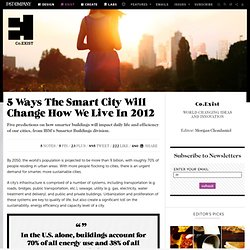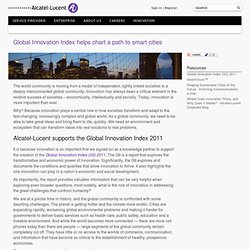

5 Ways The Smart City Will Change How We Live In 2012. By 2050, the world’s population is projected to be more than 9 billion, with roughly 70% of people residing in urban areas.

With more people flocking to cities, there is an urgent demand for smarter, more sustainable cities. A city’s infrastructure is comprised of a number of systems, including transportation (e.g. roads, bridges, public transportation, etc.), sewage, utility (e.g. gas, electricity, water treatment and delivery), and public and private buildings. Urbanization and proliferation of these systems are key to quality of life, but also create a significant toll on the sustainability, energy efficiency and capacity level of a city.
What many people don’t realize is how much buildings contribute to this strain. In the U.S. alone, buildings account for 70% of all energy use and 38% of all carbon emissions. The urgency to create more sustainable buildings comes to the forefront as President Obama recently launched the Better Buildings Initiative. The Top 10 Smart Cities On The Planet. Last year, I spent considerable time researching best practices for climate resilient cities—an endeavor that culminated in what I believe was the first ever global ranking of resilient cities.

Now, after extensive research on smart cities initiatives around the globe, I have developed what may be the first ever global rankings of smart cities. The term "smart cities" is a bit ambiguous. Some people choose a narrow definition—i.e. cities that use information and communication technologies to deliver services to their citizens. I prefer a broader definition: Smart cities use information and communication technologies (ICT) to be more intelligent and efficient in the use of resources, resulting in cost and energy savings, improved service delivery and quality of life, and reduced environmental footprint—all supporting innovation and the low-carbon economy. Here, then, are the top 10 smart cities: 1.) 2.) 3.) 4.) 5.) Neul - the Internet of Everything. Smart Cities. Smart+Connected Communities Institute: Smart City, Future Cities, Sustainable Urban Development, Intelligent Transport & Real Estate, Green Technology, Economic, Social & Environmental Sustainability, Smart Utilities. - Smart+ Connected Communities Instit.
The Smart+Connected Communities Institute site provided a hub for discovery, learning, and exchange on smart and sustainable technologies and related topics, as well as for sharing knowledge and expertise, vision and values, technical challenges and triumphs.

Discussions and resources on smart and sustainable technologies have now become mainstream. The Internet of Everything (IoE) phenomenon has become an umbrella platform for idea exchange on smart technology concepts, requiring a more holistic perspective. Therefore, the scope of the Smart+Connected Communities Institute website is no longer viable. In the coming months, we may reach out to suggest alternative websites or forums with relevant content. We wish to thank the Smart+Connected Communities Institute members for your interest, support, and engagement in the community. Questions or comments: scci-support@cisco.com. Digital Communities: Local Government News & Articles. Fireball. Culture & Society: eGovernment. Intelligent Cities Expo 2011. Intelligent Cities. Global Innovation Index. The world community is moving from a model of independent, lightly linked societies to a deeply interconnected global community.

Innovation has always been a critical element in the relative success of societies – economically, intellectually and socially. Today, innovation is more important than ever. Why? Because innovation plays a central role in how societies transform and adapt to the fast-changing, increasingly complex and global world.
As a global community, we need to be able to take great ideas and bring them to life, quickly. Alcatel-Lucent supports the Global Innovation Index 2011 It is because innovation is so important that we signed on as a knowledge partner to support the creation of the Global Innovation Index (GII) 2011. As importantly, the report provides valuable information that can be very helpful when exploring even broader questions, most notably, what is the role of innovation in addressing the great challenges that confront humanity?
European smart cities. City Forward. Intelligent Cities. Director, The Media Lab’s Smart Cities Group, MIT.